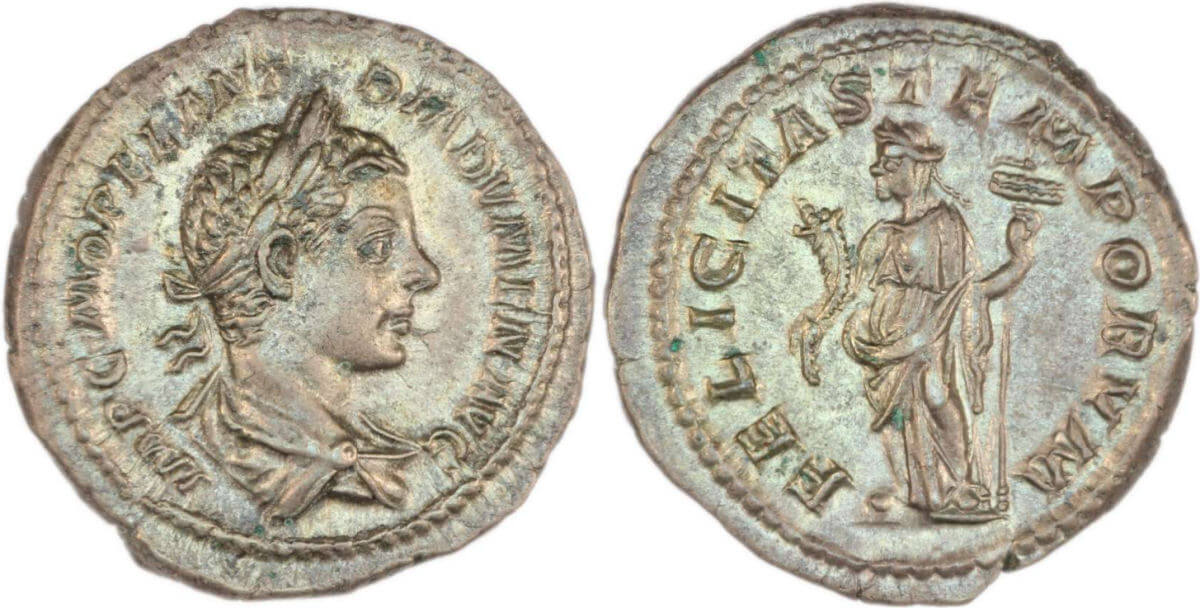Diadumenian (208 - 218 AD)
Emperor: May-June 218 AD
Marcus Opellius Antoninus Diadumenianus was the son of Rome's short-lived emperor Macrinus (AD 217-218). The boy died at the age of ten after enjoying the rank of co-emperor with his father for less than three months.
His death presaged the murderous succession struggles of the third century AD crisis which properly began a generation after his death; a crisis in which family members were treated no less severely than the fallen emperors and pretenders themselves.

British Museum, CC BY 4.0, via Wikimedia Commons
A very rare denarius coin of Diadumenian as Augustus, minted in the last weeks of his life
It is generally assumed that Diadumenian got his name because he was born with a caul - which is when the amniotic membrane that encloses a fetus thereafter covers the newborn's head and face when he or she emerges from the womb. In the case of Diadumenian, this membrane had wrapped itself tightly around the child's forehead so that it resembled a diadem.
This 'diadem' was later believed to have been an omen which signalled that the child would later wear an imperial diadem. However, there are problems with this interpretation, not least that the '-anus' suffix of the Latin 'Diadumenianus' cognomen indicates a family name.
We also know that Diadumenianus was born of a Mauretanian family and we have an earlier record (CIL viii 9366) of a Moroccan Procurator called Haius Diadumenianus who may have been the boy's maternal grandfather.
Our best account of the child's birth - the notoriously unreliable Historia Augusta - suggests the boy had both the caul and the grandfather, which is an improbable co-incidence.
Once he had become emperor, Macrinus encouraged stories about the fortuitous omens of the boy's birth, and it is very likely that he moved the child's birthday forward from September 18 to September 19, so that Diadumenian shared the same birthday as the emperor Antoninus Pius.
Diadumenian was said to have been a beautiful boy. According to the Historia Augusta, he was relatively tall. His hair was golden, his eyes were dark and his nose was aquiline. We have portraits on coins which appear to bear out this description. One of these coins also describes the boy as 'Princeps Iuventis', a 'Prince of Youth' - a title often given to an emperor's favourite son, but nowhere else attested.
In short, Macrinus appears to have done everything in his power to make his son a credible heir to the position of Roman emperor, not least because giving his son such credentials made his own position appear more authentic.
All of this was in vain, however, because the soldiery eventually rallied instead around the pretender raised by the women of the previous dynasty; an alleged illegitimate son of Caracalla who went on to become the emperor Elagabalus.
This rebellion rapidly gained strength, and prompted Macrinus to raise Diadumenian to the rank of Caesar. This made the boy a rival to Elagabalus, who was only four years older.
When the defeat of Macrinus became a serious possibility, the emperor sent his son on an 'embassy' to the Parthian king. This embassy was ostensibly to ask for the king's help against the rebels, but was almost certainly an attempt by Macrinus to get his child to safety. This attempt was also in vain, and Diadumenian was captured as he fled for the Euphrates River.
It was generally agreed that the boy had done nothing wrong apart from having a failed emperor as his father, and there was apparently a strong sentiment among the legions that the child's life should be spared. However - according to the Historia Augusta - the boy's fate was sealed by a letter which he had written to his mother, Nonia Celsa, urging her to persuade her husband to be more severe with suspected rebels.
This letter was discovered and read out to the troops:
'Our Lord and Emperor loves neither you nor himself, because he allows his enemies to live. Pay attention to Arabianus, Tuscus, and Gellius. See to it that they are held close, so if an opportunity [to have them killed] should arise, it is not allowed to slip away.'
Such apparent bloodlust in one so young persuaded the soldiers to deny Diadumenian the mercy he was not prepared to extend to others, and Diadumenian Caesar joined his father in death as a member of Rome's shortest-lived dynasty.


